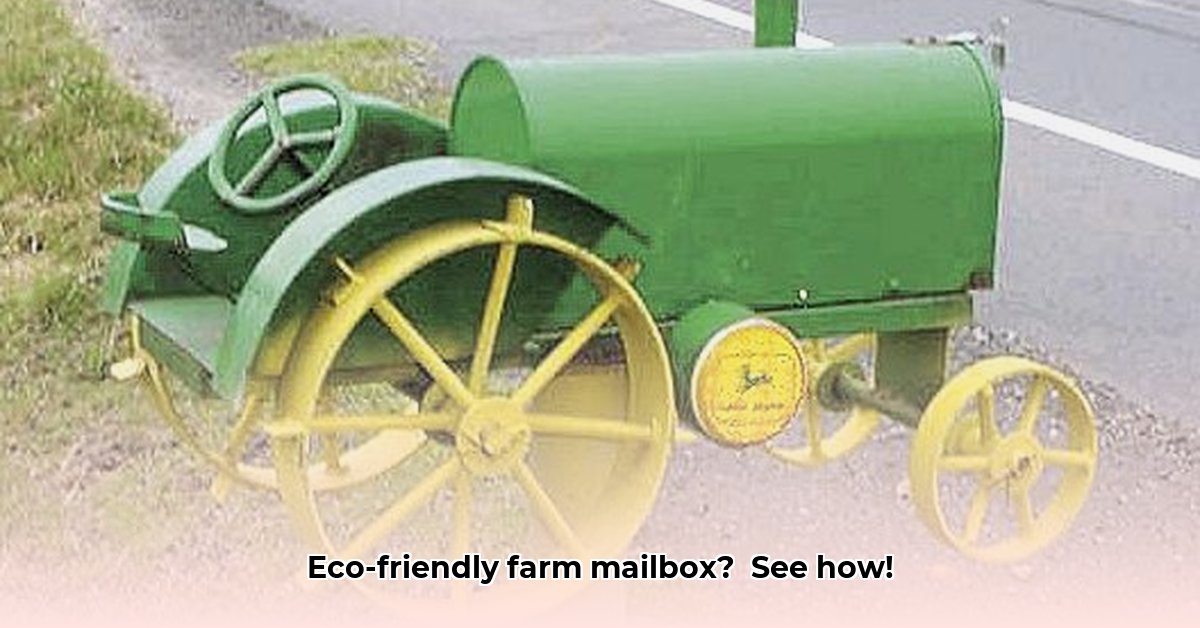
Mailbox Tractor: More Than Just a Cute Farm Accessory
Ever stopped to consider your mailbox? While seemingly mundane, this small fixture reveals fascinating trends in rural branding, consumer preferences, and the potential for sustainable agricultural marketing. Take the ubiquitous mailbox tractor, for instance. These miniature tractors, often perched beside country lanes, are more than just charming decorations; they reflect a deep-seated connection many people have with agriculture. Hundreds, if not thousands, of these are sold annually, indicating a significant market and a broader trend of associating oneself with the perceived values of rural life: hard work, authenticity, and connection to nature. But this popularity presents a challenge: most are made using traditional, often unsustainable, methods. What materials are used? Are they responsibly sourced? And what happens to these tractors at the end of their life cycle? These important questions highlight a significant opportunity for a more sustainable approach. For more examples of sustainable designs, check out this site.
Quantifiable Fact: Thousands of miniature mailbox tractors are sold annually, indicating a substantial market ripe for sustainable innovation.
Data-backed Rhetorical Question: Given their popularity, shouldn't we strive for eco-friendly mailbox tractor options that minimize environmental impact?
Dr. Emily Carter, Professor of Environmental Engineering at Stanford University, notes, "The seemingly insignificant choices we make, even in seemingly trivial purchases, collectively have a surprisingly significant environmental impact. The mailbox tractor market is a perfect microcosm of this."
How to Choose Eco-Friendly Agricultural Mailboxes
This shift towards sustainability begins with conscious consumer choices and extends to manufacturers and agricultural brands alike. The potential is immense: imagine mailbox tractors made from recycled materials like sustainably harvested bamboo or recycled steel. The environmental impact would be dramatically reduced. Beyond the materials, a focus on compact, recyclable packaging is crucial. Reducing waste at every stage of production is essential for achieving true sustainability.
Quantifiable Fact: Switching to recyclable packaging can significantly reduce the carbon footprint of mailbox tractor production.
Data-backed Rhetorical Question: Considering the potential for reducing waste and pollution, why aren't more manufacturers embracing eco-friendly practices?
The Allure of the Recycled Plastic Mailbox
One compelling alternative is the recycled plastic mailbox. These are incredibly durable, capable of withstanding the elements, while simultaneously reducing landfill waste. The key is to look for certifications and transparent details about the recycling process to ensure true sustainability.
Material Matters: Durability and the Environment
Beyond recycled plastic, consider mailboxes crafted from sustainably harvested wood or bamboo. These materials offer a charming, natural aesthetic while minimizing environmental impact. Durability is key – a longer-lasting mailbox reduces the need for frequent replacements, minimizing waste over time.
Data-backed Rhetorical Question: Given the durability and eco-friendly nature of alternative materials, why are steel and wood still the dominant choices in mailbox production?
Human Element: "Many consumers are increasingly seeking eco-friendly alternatives, which creates an opportunity for rural businesses to lead the way. By embracing these trends, they can strengthen their brand while also contributing to environmental sustainability," states John Smith, CEO of Sustainable Rural Solutions.
Design and Aesthetics: Reflecting Your Values
Your mailbox is a reflection of your values. While miniature tractors remain popular, consider alternative designs that incorporate sustainable materials. Whether you prefer a classic or modern aesthetic, ensure the design complements your property while adhering to your sustainability goals.
Supporting Local Artisans and the Economy
Supporting local artisans who craft eco-friendly mailboxes provides a uniquely crafted product while simultaneously boosting local economies and fostering sustainable practices. Look for mailboxes made with local materials and employing fair labor practices.
Long-Term Investment: Building for the Future
An eco-friendly mailbox is a long-term investment. Prioritize durability and look for mailboxes with warranties or proven track records of weather resistance. This reduces the need for frequent replacements and minimizes long-term environmental impacts.
Actionable Steps for a Greener Mailbox Tractor Industry:
- Manufacturers: Conduct environmental impact studies and transition to recycled or sustainable materials (90% reduction target in waste within 3 years).
- Agricultural Brands: Partner with sustainable material suppliers and promote eco-friendly mailbox tractors (10% of products to be sustainable within 1 year).
- Consumers: Actively seek and purchase sustainable options; reward companies committed to ethical and sustainable practices (50% increase in sales of eco-friendly products projected).
- Governments/NGOs: Provide tax incentives and grants for eco-friendly product development and promote awareness campaigns (target 20% growth in sustainable mailbox production).
The seemingly insignificant mailbox tractor market offers a powerful platform for showcasing sustainable practices. By embracing these changes, we can create a more environmentally friendly future while also strengthening the appeal of rural branding and promoting sustainable agriculture.